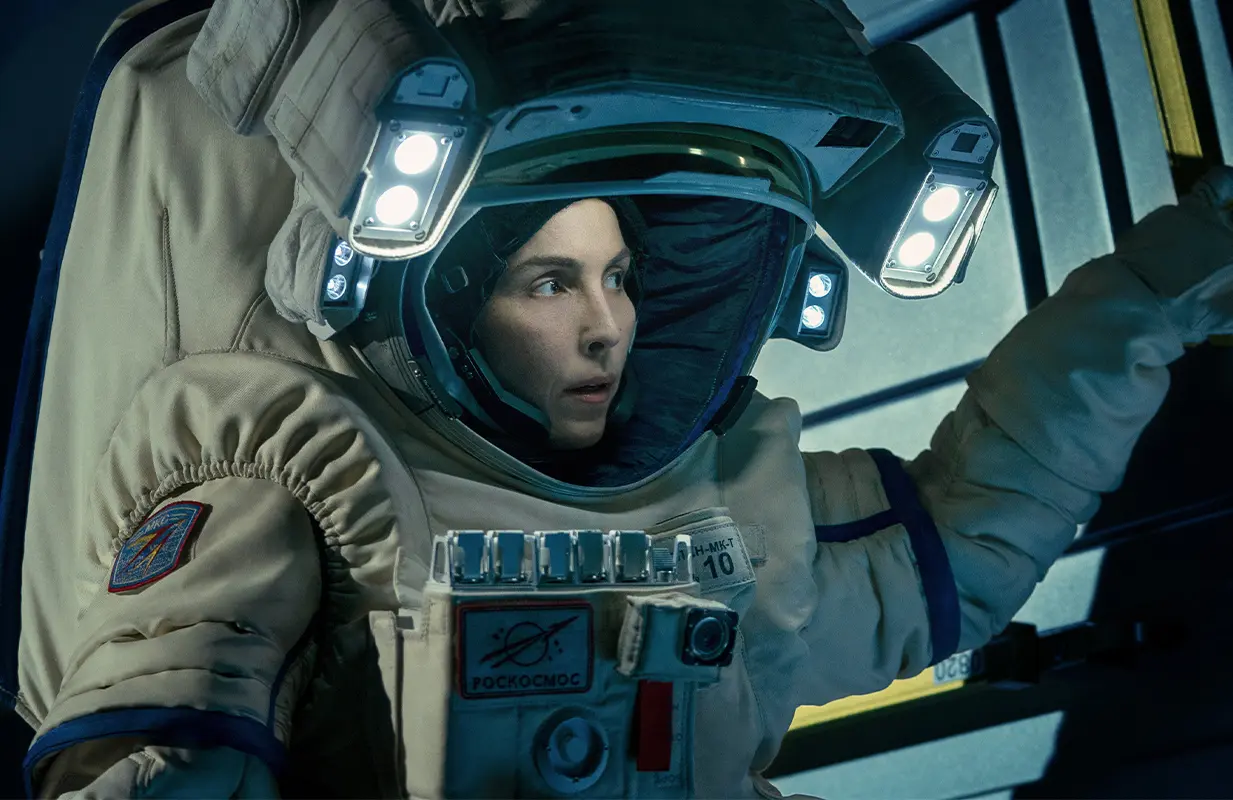Constellation Is a Spooky Trip to Where Sci-Fi Mysteries Have Gone Before
-
 Noomi Rapace in Constellation (Photo: Apple TV+)
Noomi Rapace in Constellation (Photo: Apple TV+)There are lots of movies and TV shows about the discombobulating experience of going to space. Much rarer are stories about what happens when these travelers come home. Zero gravity and the glow of starlight can take a serious toll on the body. And beyond the physical aftershocks, there’s the less tangible, harder to quantify psychological effects of touching down on Earth after months or even years floating above it. How do you go back to a normal life after you’ve seen the whole world from up there? And who else could possibly relate to what the few, the proud, the interstellar have experienced?
“Astronaut burnout” is the term someone uses to describe this particularly steep reacclimation process in Constellation, a spooky new science-fiction mindbender coming soon to Apple TV+. Over eight tense hours, the series unfurls a mystery likely to buzz the synapses of anyone keen on Philip K. Dick or Fringe. Such what’s-real-and-what-isn’t intrigue is its own reward, a thread worth untangling. But in Constellation, it also becomes a sly, high-concept metaphor for the dilemma of the returning spacewoman — for the way that life can just seem different than how the recently orbital might remember it was before blast off.
The first two episodes tease out a larger conspiracy while chronicling an urgent disaster in the vacuum. Something collides with the International Space Station, and an astronaut (William Catlett) loses his arm — the blood released in shiny, bulbous red globs — and then his life. The culprit: a mummified body in an old USSR uniform, discovered bouncing across the surface of the station by spacewalking crewmate Jo (the girl with the dragon tattoo and the sharp cheekbones, Noomi Rapace).
Forced to stay behind for repairs, cut off from ground control while she tightens literal nuts and bolts, Jo finds herself “the loneliest person in the universe.” As directed by Michelle MacLaren, a master of small-screen suspense who’s punched up the action of Breaking Bad and Game of Thrones, these scenes coalesce into a miniature survival thriller, like Apollo 13 aboard the Event Horizon. Jo performs procedural tasks in an orbiting haunted house (the kind of marvel of convincing set design you’d expect to see in a Hollywood blockbuster with NASA consultants) as ghostly visions destabilize her sense of time and place.
The real weirdness begins once Jo miraculously makes her way back to terra firma and finds life not exactly as she left it. Her husband, played by James D’Arcy, alludes to trouble in paradise to which she has no recollection. And her daughter, Alice (Rosie Coleman), seems different, too. As little things add up, her employers become increasingly determined to paint her growing uncertainty – as well her report of that Soviet corpse — as garden variety PTSD. Here, the show’s title gains a dual meaning, medically diagnostic as well as celestial.
Is something changing the shape of reality? Have Jo’s memories been insidiously altered, or is she just cracking up? Writer-creator Peter Harness, the English playwright behind McMafia (and, more relevantly, several episodes of Doctor Who), takes his time providing answers. It’s clear early on that they’ll involve NASA mission commander Henry Caldera (Jonathan Banks), who saved the lives of a couple fellow astronauts during an earlier calamity in space. Or did he? That the mission in question was Apollo 18, codename of a real mission NASA canceled in the ’70s, suggests that the show is making its own revisions to reality, unfolding an alternate history of global space exploration.
Sci-fi fans will probably get ahead of the big revelations. Constellation arguably spends too long dancing around an increasingly obvious conclusion. And later episodes disappear a little too deeply into a convoluted miasma of plot developments; shifting the action to a snowy rural Sweden previously glimpsed in what appear to be flash forwards, Harness muddies the logic of his conceit through a crosscutting flurry of parallel activity that doesn’t make a ton of sense. To say much more would be to float into spoiler territory — though, again, you don’t need to be a quantum physicist to beat Jo to the truth.
Still, the series prolongs its pulse of gripping paranoia, a cousin to the vintage X-Files formula of coverups gradually uncovered. More admirably still, it steeps its pulpiness in an emotional reality, grounding the show even when it threatens to disappear into a black hole of metaphysical twistiness. Constellation’s interest in wild, theoretical science doesn’t quite eclipse the drama of Jo’s harsh homecoming — how she struggles to feel connected to her loved ones and to plant her feet again after a transformative star trek. The scenes between Rapace and D’Arcy never feel like filler; with them in the roles, the mysteries of the universe seem no less pressing than the matter of holding together a relationship that becomes very long distance indeed.
And there’s something richer still in the multi-layered performance Banks delivers. Cleanly compartmentalizing the professional authority and embittered saltiness that jointly defined his tenure as Albuquerque fixer Mike Ehrmantraut, the actor embodies the cruel fickleness of destiny — the way your whole future can be decided by circumstances beyond your control, whether you’re taking one small step out your front door or one giant leap across a lunar surface. He’s the divided soul of Constellation, and the best reason to hope that there’s a future for the show, which ends on a note of ambiguity that could prove conclusive or anticipatory as viewer demand dictates.
Constellation premieres February 21 on Apple TV+ with three episodes. New episodes drop weekly. Join the discussion about the show in our forums.
A.A. Dowd is a writer and editor who lives in Chicago.
TOPICS: Constellation, Apple TV+, Jonathan Banks, Michelle MacLaren, Noomi Rapace, Peter Harness, Science Fiction